On many levels, the book is splendid as both an introduction to Buddhist spirituality and an explication of Shantideva for contemporary Westerners. Library Journal One does not have to be a Buddhist to appreciate the beauty of the teachings and the simplicity of the life presented here. Indeed, non-Buddhists may discover a refreshing new approach to the doctrines of love your neighbor, and do unto others. Booklist ABOUT THE BOOKThe fourteenth Dalai Lama, a living embodiment of the bodhisattva ideal, presents detailed practical guidance based on sections of The Way of the Bodhisattva by Shantideva, the best-known text of Mahayana Buddhism. The Dalai Lama explains this classic and beloved work, showing how anyone can develop a truly good heart and the aspiration for the enlightenment of all beings. In this book, the Dalai Lamas profound knowledge is evidentthe result of extensive training. Here he shares his extraordinary insight into the human condition and what it means to be a responsible and caring person.HIS HOLINESS THE DALAI LAMA, Tenzin Gyatso, was born in 1935 in the province of Amdo in eastern Tibet. When he was two years old he was recognized as the fourteenth in the line of Dalai Lamas, the spiritual masters who for three centuries had governed the country. After China invaded Tibet, the Dalai Lama took refuge in Northern India, where he has led and inspired the Tibetan community in exile.Sign up to learn more about our books and receive special offers from Shambhala Publications.

Or visit us online to sign up at shambhala.com/eshambhala.

Shambhala Publications, Inc.
Horticultural Hall
300 Massachusetts Avenue
Boston, Massachusetts 02115
www.shambhala.com
1994 by Association Bouddhiste des Centres de Dordogne
Translation of the Way of the Bodhisattva
1997, 2006 by the Padmakara Translation Group.
For the Benefit of All Beings is an updated edition of a book previously published as A Flash of Lightning in the Dark of Night (Shambhala, 1994).
All rights reserved. No part of this book may be reproduced in any form or by any means, electronic or mechanical, including photocopying, recording, or by any information storage and retrieval system, without permission in writing from the publisher.
Library of Congress Cataloging-in-Publication Data
Bstan-dzin-rgya-mtsho, Dalai Lama xiv, 1935
[Flash of lightning in the dark of night]
For the benefit of all beings: a commentary on The way of the Bodhisattva / Tenzin Gyatso, the Fourteenth Dalai Lama, foreword by Tulku Pema Wangya; translated from the Tibetan by the Padmakara Translation Group.
p. cm.(Shambhala classics)
Includes bibliographical references and index.
eISBN 978-0-8348-2411-9
ISBN 978-1-59030-693-2 (pbk.: alk. paper)
1. Santideva, 7th cent. Bodhicaryavatara. 2. Mahayana BuddhismDoctrines. I. Santideva, 7th cent. Bodhicaryavatara. English. II. Title. BQ3147.b774 2009
BQ3147.b774 2009
294.3 85dc22
2008044079
CONTENTS
PUBLISHERS NOTE
This book contains many Sanskrit diacritics and special characters. If you encounter difficulty displaying these characters, please set your e-reader device to publisher defaults (if available) or to an alternate font.
H IS H OLINESS the Dalai Lama, Tenzin Gyatso, was born in 1935 in the province of Amdo in eastern Tibet. When he was two years old he was recognized as the fourteenth in the line of Dalai Lamas, the spiritual masters who for three centuries had governed a country three times the size of France that was united and independent throughout its two-thousand-year history.
In 1950, Communist China invaded Tibet under the pretext of bringing about a peaceful liberation. In reality what this entailed was the destruction of an entire people and its culture. Today, both are threatened with extinction.
One man, the Dalai Lama, was to become the symbol of the dramatic fight for the survival of Tibet as a nation. Since 1959, as a refugee in Dharmasala, North India, he has led and inspired the Tibetan community in exile. As a spokesman for nonviolence, he has worked untiringly for world peace. As a spiritual teacher communicating his wisdom and his experience of altruism with great simplicity, he is universally respected and venerated by millions of Buddhists who regard him as the Buddha of Compassion. For him, Buddhism is not a dogma or religion but a way of life, a source of happiness, inner peace, and wisdom. It awakens in us kindness and love, teaching us to protect every living thing on this earth. This is why he emphasizes universal responsibility, the awareness that each one of us, as a member of the human family, can be a worker for peace and a protector of the environment: Outer disarmament comes from inner disarmament. The only true guarantee of peace lies within ourselves.
It was in this spirit that His Holiness taught for a whole week in August 1991 in Dordogne, southwestern France. Commenting on one of the greatest poetic works in Buddhist literature, Shntidevas
Bodhicharyvatra (The Way of the Bodhisattva), he introduced several thousand people to the way of compassion, the path of the Bodhisattvas who, overwhelmed by the suffering of beings, take the vow to perfect themselves in order to liberate others. Despite the fact that His Holiness has given this teaching many times, so truly and fully does he live this ideal that on occasion he himself was moved to tears by the beauty of Shntidevas text.
Just like this great Indian master of the eighth century, the Dalai Lama talks about human nature in simple and moving terms. He urges us to develop the potential we all have for love and kindness. Appealing to our everyday experience, he shows us how to become goodhearted people and give our lives direction and meaning.
T ULKU P EMA W ANGYAL January 1992
We are most grateful to the Tibetan lamas who invited His Holiness the Dalai Lama to Dordogne in August 1991: Shenphen Dawa Rinpoche, Lama Jigme Rinpoche, Taklung Tsetrul Rinpoche (Tulku Pema Wangyal), and the late Nehnang Pawo Rinpoche. Because of their combined efforts, a great many people were able to meet His Holiness and attend, for the first time in France, a complete cycle of his teachings.
Members of the Padmakara Translation Group who worked on the translation of these teachings from Tibetan include Jigme Khyentse Rinpoche, Stephen Gethin, Wulstan Fletcher, Michal Abrams, Vivian Kurz, John Canti, and Kristina Permild, with invaluable additional help given by Konchog Tenzin and Christine Fondecave.
The extracts from Shntidevas Bodhicharyvatra have been printed with kind permission of the Padmakara Translation Group.
A SSOCIATION OF B UDDHIST C ENTERS IN D ORDOGNE
A LTHOUGH the Dalai Lama has become a familiar figure in the West, with numerous publications and regular appearances on television and in conference halls, this book marks an unusual event in his visits to Europe and North America. For an entire week, to an audience of more than two thousand people under an enormous marquee, His Holiness gave a traditional teaching on a great classic of Buddhist literature.
Shntidevas Bodhicharyvatra is a text covering the whole path to enlightenment, and while it never fails to inspire, it contains sections that require detailed commentary if they are to be fully understood. A complete oral commentary can take several months, and within the time available, it was not possible for His Holiness to cover more than the essential points expounded by Shntideva. In particular, he was only able to give a brief introduction to the very difficult ninth chapter of the text, which he taught in greater detail in November 1993. These teachings have since been published as Practicing Wisdom (Wisdom Publications, 2004). Neither was there time for him to comment on the tenth chapter.
Next page
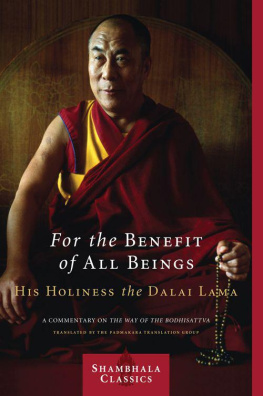
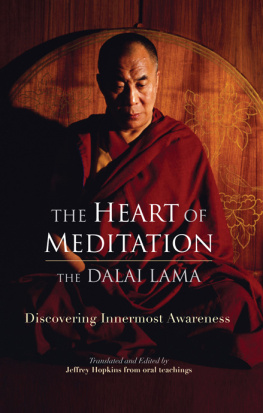
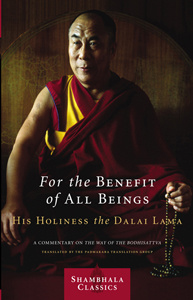
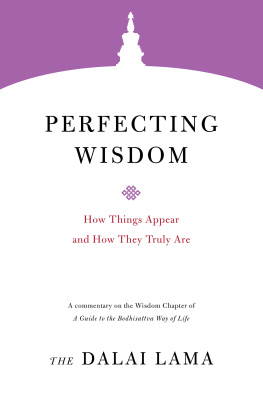
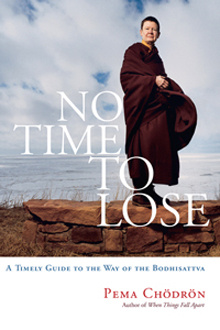
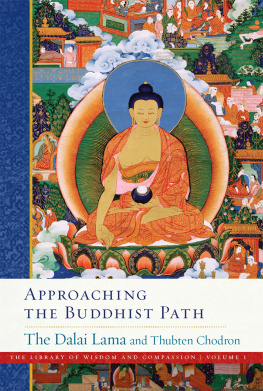
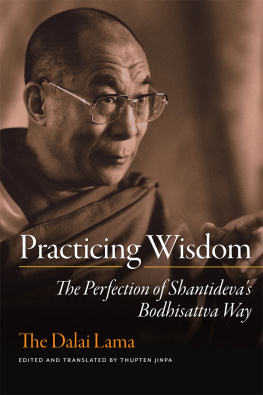
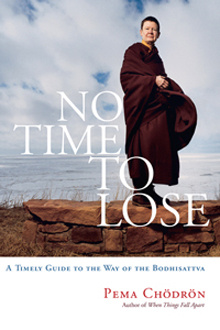
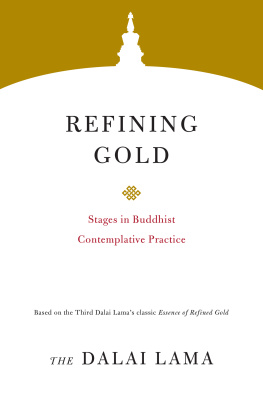
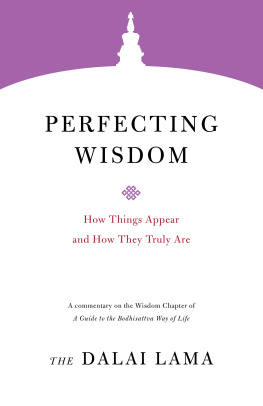
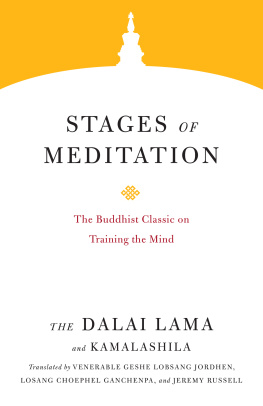

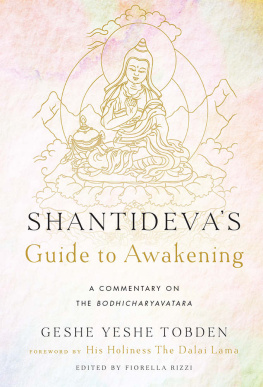
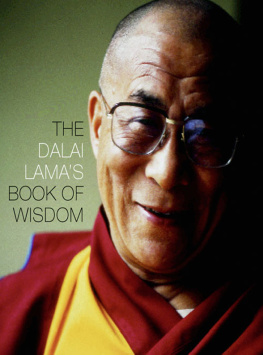
 Or visit us online to sign up at shambhala.com/eshambhala.
Or visit us online to sign up at shambhala.com/eshambhala. 